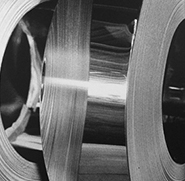Stainless steel is known for its resistance to corrosion. Furthermore, its mechanical properties make it particularly suitable for moulding and structural applications.

Stainless steel, since its discovery at the end of the nineteenth century, is sub-divided into numerous categories based on its end use, chemical composition and metallurgy properties (i.e. ability to mould).
Even if there are more than 300 types of stainless steel currently in production, there are 3 main ranges in which the various grades are grouped, based on their micro-structure:

Stainless steels which – beside the necessary percentage of Chromium – contain a good amount of Nickel and possibly of Molybdenum.
more »

Stainless steels containing a good amount of chromium but without addition of nickel and other elements capable of forming austenite.
more »

Martensitic stainless steels represent the smallest family of stainless steels available on the market.
more »